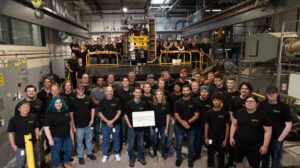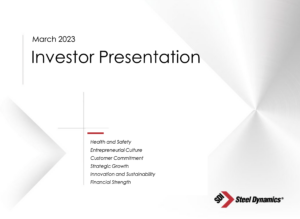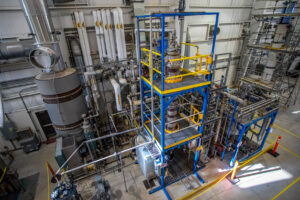BuildSteel is tracking the sustainability initiatives led by various SFIA members and other steel industry players. Here are some of the activities initiated by companies with a direct bearing on cold-formed steel (CFS) framing.
ArcelorMittal Invests $36 Million in Steel Decarbonization Disruptor Boston Metal
ArcelorMittal (its standalone subsidiary ArcelorMittal Dofasco is an SFIA member) has invested $36 million in Boston Metal, an MIT spinout startup.

ArcelorMittal has invested $36 million in steel decarbonizing startup Boston Metal. (Photo: ArcelorMittal)
The transaction is ArcelorMittal’s largest single initial investment to date through its XCarb® Innovation Fund. The fund, launched in March 2021, targets investing in the best and brightest technologies that hold the potential to play a meaningful role in the decarbonization of the steel industry, a process ArcelorMittal intends to lead.
ArcelorMittal’s investment has led a $120 million Series C fundraising round undertaken by Boston Metal. Other participants in the round include Microsoft’s Climate Innovation Fund and SiteGround Capital, who join Boston Metal’s existing shareholder register which features the likes of Breakthrough Energy Ventures, mining majors Vale and BHP, BMW i Ventures and several clean-tech venture capital funds.
Founded in 2013, Boston Metal is developing and commercializing a patented Molten Oxide Electrolysis (MOE) platform for decarbonizing primary steelmaking. MOE uses electricity to produce molten steel through a direct, one-step process. The MOE cell is capable of processing a wide range of iron ore grades through high temperature electrolysis, producing relatively impurity-free liquid steel with no accompanying CO2 emissions. As a fully customizable steel manufacturing solution, the modular MOE cells can be scaled until desired production capacity is reached.
“In Boston Metal, we are investing in a team that has made impressive progress over a relatively short period of time, developing a technology that has exciting potential to revolutionize steelmaking,” said ArcelorMittal CEO Aditya Mittal. “In our extensive discussions with them, we have been impressed by the passion and vision they have to contribute to the decarbonization of steelmaking.”
Read the full ArcelorMittal press release here.
SDI’s GHG Emissions Are 42% of North American Average
Steel Dynamics Inc. , one of the largest steel producers and metals recyclers in the United States and an SFIA member, noted in a March 2023 presentation to investors that its six electric arc furnace steel mills emit 0.42 metric tons of CO2 equivalent emissions per metric ton of cast steel made. That puts SDI’s GHG emissions intensity it at less than half the North American steel industry average of 1 ton and less than one-fourth the global average of 1.7 tons.

SDI recently told investors the energy use at its steel mills, per metric ton, was 77% less than the average for steel mills worldwide.
“Our steelmaking operations already meet the 2050 intensity targets under the Paris Agreement and its 2 degrees Celsius scenario,” says slide 24 in the SDI presentation.
The same slide continues: “We are aligned with the Science Based Targets Initiative (SBTi) as we plan for our steel mills to meet the SBTi ‘well below 2 degrees Celsius’ scenario target for combined Scope 1 and 2 emissions intensity by at least 2030.”
The next slide, number 25, says that SDI operates “exclusively with EAF technology, a circular manufacturing model, and innovative teams creating solutions to increase efficiencies, reduce raw material usage, reuse secondary materials, and promote material conservation and recycling.”
In 2022, the company reintroduced 12 million tons of recycled ferrous scrap into the manufacturing life cycle and 1.1 billion pounds of recycled nonferrous scrap into the manufacturing life cycle.
Steel Dynamics’ circular manufacturing model is invested entirely in EAF technology, which primarily uses recycled scrap to produce new steel. The company’s steel mills Scope 1 GHG emissions are 88% lower per metric ton compared to average U.S. blast furnaces, the report says. It also says that the energy usage per metric ton at SDI steel mills is 77% less than world steel averages, and 100% of the water withdrawn from SDI steel mills is recycled and reused.
Read the complete March 2023 SDI investor presentation here.
U. S. Steel and CarbonFree Agree to Pursue CO2 Capture Together
United States Steel Corporation (NYSE: X), a leading steel producer and SFIA member, and CarbonFree Chemicals Holdings, LLC, have signed a non-binding memorandum of understanding to jointly pursue the capture of CO2 emissions generated from U. S. Steel’s Gary Works manufacturing plant using CarbonFree’s SkyCycle™ technology. If a definitive agreement is reached, the project is expected to capture and mineralize up to 50,000 metric tons of CO2 per year, the equivalent to carbon emissions from nearly 11,000 passenger cars.

CarbonFree’s SkyCycle is designed to directly capture CO2 emissions from a wide variety of industrial emitters. (Photo: Business Wire)
CarbonFree’s patented SkyCycle technology captures carbon emissions from hard-to-abate industrial sources before entering the atmosphere, converts the CO2 into the specialty chemical precipitated calcium carbonate, and produces hydrochloric acid as a co-product.
Located in Gary, Indiana, U. S. Steel’s Gary Works has annual production capability of 7.5 million net tons of raw steel per year. The MoU establishes a framework for discussions regarding the formation of a commercial venture.
“We are eager to enter the next phase of discussions with CarbonFree to explore the possibility of meaningful CO2 emission reductions in our operations in a capital efficient manner,” said Richard L. Fruehauf, SVP – Chief Strategy & Sustainability Officer at U. S. Steel.
SkyCycle technology is modular, scalable and patented and is designed to directly capture CO2 emissions from industrial emitters. The technology produces PCC for sale into the global specialty chemicals market, and calcium carbonate for the sequestration of CO2. PCC is a high-value product used for a variety of industrial purposes, including in the manufacturing of paper, plastics, ceramics, paints, coating, adhesives, sealants, rubber and cleaning products. Additionally, CO2 that is converted to calcium carbonate can be permanently stored as an environmentally friendly mineral.
Read the complete U.S. Steel news release here.
CFS Meets All Sustainability Requirements
Cold-formed steel (CFS) meets the highest sustainability requirements set in all major green building standards and rating programs, including the Leadership in Energy and Environmental Design (LEED®) from the U.S. Green Building Council, the National Green Building Standard (ICC-700) for residential buildings, ASHRAE Standard 189.1 for commercial construction and the International Green Construction Code (IgCC). According to the American Iron and Steel Institute:
- Steel framing contains a minimum of 25% recycled steel and is continually and completely “remade without any loss of quality”
- Most other construction products can only be down-cycled into lower-quality products
- Steel framing minimizes construction site waste
Additional Resources
- Update #6 | Sustainability news from Cleveland-Cliffs, Worldsteel and U.S. Steel
- Update #5 | News from Nucor, Cleveland-Cliffs and a New Low-Emissions Steel Coalition
- Update #4 | Steel Framing Industry Sustainability Initiatives
- Update #3 | Steel Framing Industry Sustainability Initiatives
- Update #2 | Steel Framing Industry Sustainability Initiatives
- Update #1 | Steel Framing Industry Sustainability Initiatives
